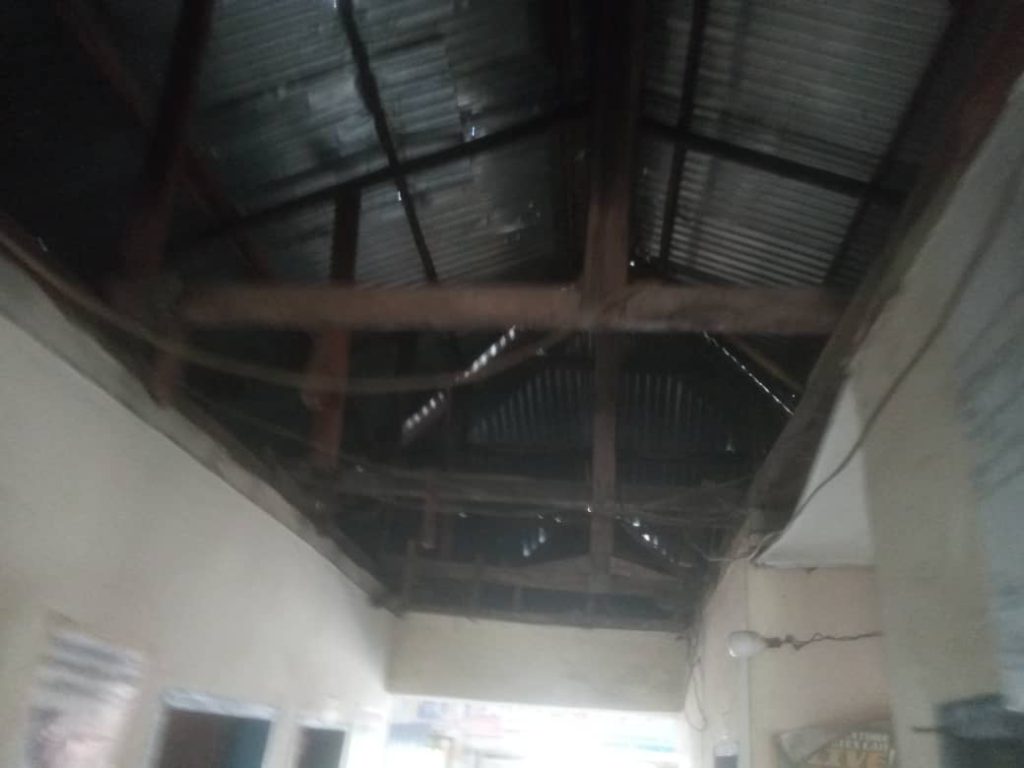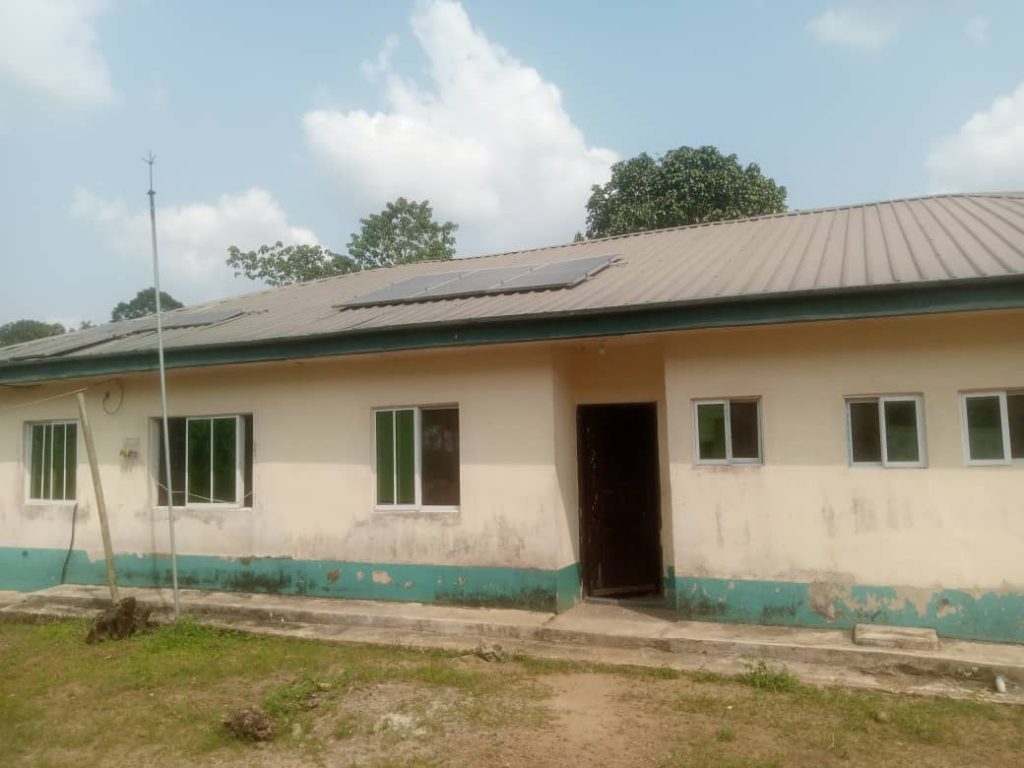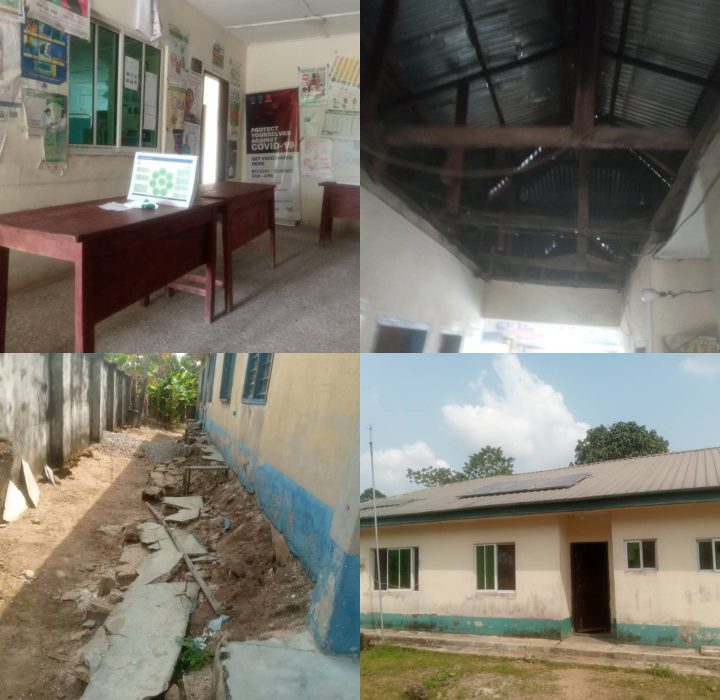By Sylvia Akpan
In a stark contrast to the state government’s annual boasts about its achievements in the health sector, a staggering 849 Primary Healthcare Centers (PHCs) in Cross River State, remain non-functional. This leaves only 196 PHCs operational out of a total of 1,045 spread across the state.
Having identified poor behavior change, staffing, funding vandalism, government neglect as ruiners of PHCs in Cross River, both patients and medical experts alike are intensifying calls for interventions at PHCs.
This investigation by CrossRiverWatch, reveals a worrying disconnect between the government’s claims of renovation and maintenance, and the harsh reality faced by residents, workers, and observers. Despite substantial financial investments, the condition of these PHCs tells a different story.
The problems plaguing PHCs in Cross River are multifaceted. Some of the facilities visited in Ogoja, Akamkpa, Calabar South and Odukpani Local Government Areas indicate a call for immediate calls for interventions.
Absence Of Medical Doctors Slows Referrals, Diagnosis
This piece reveal that PHCs across Ogoja, Calabar South, Akamkpa and Odukpani Local Government Area do not have resident medical doctors working in them. The facilities lack adequate manpower as only few staff are found present at the facilities. One of the pressing needs of the facilities is the deployment and doctors that will attend to patients who seek care.
PHCs in Bansara, Ogoja, reveals that diarrhea, malaria and pneumonia, are the most prevalent illnesses treated at the facility because of the river that exists and refusal to use mosquito-treated nets health workers say.
Community Health Officer Exposes The Dire State Of Bansara PHC
In a shocking revelation, a Community Health Officer, who wished to remain anonymous, has lifted the lid on the deplorable conditions at the PHC in Bansara community, Ogoja. According to the Officer, “We are fighting a losing battle. We have so many challenges, especially in the areas of immunization.
“There is no refrigerator, which is responsible for our low coverage rates. We are struggling to provide basic care to our community and you know that the absence of a refrigerator has severe consequences in compromising the efficacy of vaccines and essential medications,” she added.
A Patient’s Plea
Between May 2024 and November 2024, the PHC in question recorded its highest attendance of 214 persons. However, despite the relatively high turnout, patients like Mrs. Gbanya Margaret, who was diagnosed with malaria, was left to lament the poor state of facilities.
“We need more facilities and amenities inside the PHCs. The staff here are very good, but the toilets are not working because there is no water. We need a good water system.”
It was also observed by the reporter that the borehole in the facility is highly polluted, as it possesses an offensive odour that scares intending users.
A Facility On The Brink
A visit to the Afokang by Jebs PHC in Calabar South reveals a stark reality. Inadequate staffing is the major challenge, with only 8 staff members present to cater to the healthcare needs of the community. The facility requires at least 40 staff members to operate effectively.
Eyo Nsa, one of the health workers at the facilities posited that “One of our biggest concerns is the staffing situation. We are already operating with a skeleton crew of just 8 staff members, and 2 of them are set to retire by December 2025.

“We desperately need retraining and capacity building for our staff. This would help ensure that we can continue to provide quality care to our patients.
When the reporter asked to see the restrooms in the facility, tears exuded out of his eyes and he added: “Our toilet facilities are poor, our furniture is broken, and we do not have a reliable source of electricity. No solar, no generators. We are in dire need of improvements to our infrastructure.
“We are struggling to provide the level of care our patients deserve and it is frustrating for us as healthcare workers, because it is putting our patients’ health at risk”.
He called on the government to intervene and address the pressing issues so that they can provide the best possible care for their patients.
Records show that the facility records 3,000 cases of malaria and typhoid annually, as its most prevalent health challenge. Other records include one thousand cases of scabies. But every other ailment is controlled. Total visitors to the facility annually stands at 1,460 patients as at December 2025. Staff said a staff quarters is needed at the facility.
No Ambulances, Referrals May Suffer Delay, High-Risk
CrossRiverWatch gathered that Primary Healthcare Centers facilities in Mfamosing, Jebs Health Post, Akpap Okoyong, and Bansara are operating without ambulances as it poses a threat to patients’ lives, particularly in emergency situations.
Nurse Agnes Idagu, a healthcare worker at one of the affected PHCs, sounded the alarm on the dire consequences of this shortage: “Here, as you have seen, we don’t have any ambulances. If there is an emergency now, it will be difficult to take the patients to another facility,” she warned.
When asked about the implications of this shortage, Nurse Idagu emphasized, “I do not want to go into the academic relevance of ambulances, but the whole world knows how important ambulances are to our field. I don’t think there is any PHC in this area that has their own ambulance.”
She appealed to the Cross River State Government to take immediate action, saying, “I will suggest that the government prioritizes the initiative of acquiring ambulances for Primary Healthcare Centers. It will go a long way.”
One of the patients, Mrs. Esther Okon, narrated her predicament when she was in labour and needed to get to the facility.

According to her: “I was in labor, and my husband had to rush me to the hospital on his motorcycle. The pain was unbearable, and I was scared for my baby’s life. I remember clinging to my husband, praying that we would make it to the facility on time. The motorcycle was moving so fast, and I was terrified of falling off.
“If there was an ambulance, I would not have had to go through that traumatic experience. I would have received proper care and attention during the transportation. The ambulance personnel would have monitored my condition and ensured that I was comfortable and safe.
“Unfortunately, we did not have that luxury. We had to rely on my husband’s motorcycle, which was not equipped to handle emergency situations. When we finally arrived at the facility, I was exhausted and in so much pain. The doctors had to act quickly to save my baby’s life.
“It has been a few months since the incident, but the memory still haunts me. I keep thinking about what could have happened if we had access to an ambulance. It’s a scary thought, but it’s a reality that many women in our community face every day.”
Mr. Emmanuel Etim narrated his ordeal: “I lost my wife during childbirth because we couldn’t get her to the hospital on time. The nearest hospital was miles away, and we didn’t have access to an ambulance. I had to watch my wife slip away, feeling helpless.
“It’s a pain that I’ll carry for the rest of my life. I keep thinking about what could have happened if we had access to an ambulance. Maybe my wife would still be alive today.
“The experience was traumatic, and it’s been difficult for me to cope. I have to take care of our children alone now, and it’s a challenging task.
“I am advocating for better emergency services, including ambulances, so that no one else has to go through what I went through. We need to ensure that our communities have access to proper healthcare facilities and equipment.
“I am not just a grieving husband, I am a concerned citizen who wants to see change. I want to see our community thrive, to see people living healthy and fulfilling lives. And I know that it’s possible, if we just have the will to make it happen.
“So I’m asking you as a journalist to do your best in spreading this news and I’m equally calling on our leaders to take action by providing us with the ambulances and emergency services we so desperately need.
“Let us work together to build a healthier, safer, and more compassionate community. Let’s make sure that no one else has to go through what I have gone through.”
Health Worker Blames Worsening Health Compliance On Behavior Change
Mr. Linus Mfon, a health worker with years of experience, has blamed the worsening health compliance in Nigeria on the lack of behavior change among citizens. According to him, the refusal of individuals to use insecticide-treated nets and practice good environmental sanitation has led to the resurgence of illnesses like malaria and scabies.
“The problem with some Nigerians is that we are not civilized,” Mr. Mfon lamented. “Most of the people within our catchment area are not using mosquito nets. They are rather using them to farm or to groom animals. No good sanitation is also a major challenge, coupled with poor personal hygiene.”
Despite efforts by the government and health organizations to promote healthy behaviors, many Nigerians remain resistant to change.
“We have tried educating them, we have tried sensitizing them, but it is just not working,” Mr. Mfon said. “We need to find new ways to get through to people, to make them understand the importance of taking care of their health.”
Billions Allocated, Millions Unspent: The Case Of Cross River’s PHCDA Funding
According to the State financial records, Cross River State spent N1,922,941 between 2020, 2021 and 2023 on Primary Healthcare Center Development Agency (PHCDA) renovation and maintenance while the approved budget showed that the state budgeted 4 billion Naira in 2020, 80 million Naira in 2021, and 6 million Naira in 2023 for the same purpose but despite the substantial allocation of funds, the state’s PHCDA facilities continue to grapple with deplorable conditions, leaving residents vulnerable to health risks.
The communities of Jebs, Akpap Okoyong, Mfamosing, and Bansara are among those bearing the brunt of this predicaments. Residents in these areas are forced to navigate treacherous healthcare landscapes, characterized by inadequate facilities, equipment, and personnel.
We’ve Commenced Phase-By-Phase Renovation – State Government
Speaking to the State Director General, Primary Healthcare Development Agency, Vivian Mesembe, she assured that renovation of 95 of the 1,45 facilities across the state has commenced. She said it’s a phase by phase arrangement that will cover all the facilities.
“We are renovating please, we have started renovation, let us finish renovation first, we are doing it phase by phase. Go to the Primary Healthcare Development Agency Facebook page, all the information is there.
“Every local government has ambulances you can ask the local government directors, they will show you,” she said in sharp contrast to CrossRiverWatch’s investigation.
She continued: ” I have one thousand and forty five primary healthcare centers to renovate. This First phase involves 95 facilities, with support from National Primary Healthcare Development Agency, State Government and IMPACT.”
The story is supported with funding from the Center for Journalism Innovation and Development (CJID).
Since You Are Here, Support Good JournalismCrossRiverWatch was founded on the ideals of deploying tech tools to report in an ethical manner, news, views and analysis with a narrative that ensures transparency in governance, a good society and an accountable democracy. Everyone appreciates good journalism but it costs a lot of money. Nonetheless, it cannot be sacrificed on the altar of news commercialization. Consider making a modest contribution to support CrossRiverWatch's journalism of credibility and integrity in order to ensure that all have continuous free access to our noble endeavor. CLICK HERE |
New Feature: Don't miss any of our news again.Get all our articles in your facebook chat box.Click the Facebook Messenger Icon below to subscribe now
Text Advert by CRWatch :Place Yours

Will You To Learn How To Make Millions Of Naira Making Special Creams From Your Kitchen?.Click Here
Expose Your Business And Make More Sales. Advertise On CrossRiverWatch.com Today



Leave feedback about this